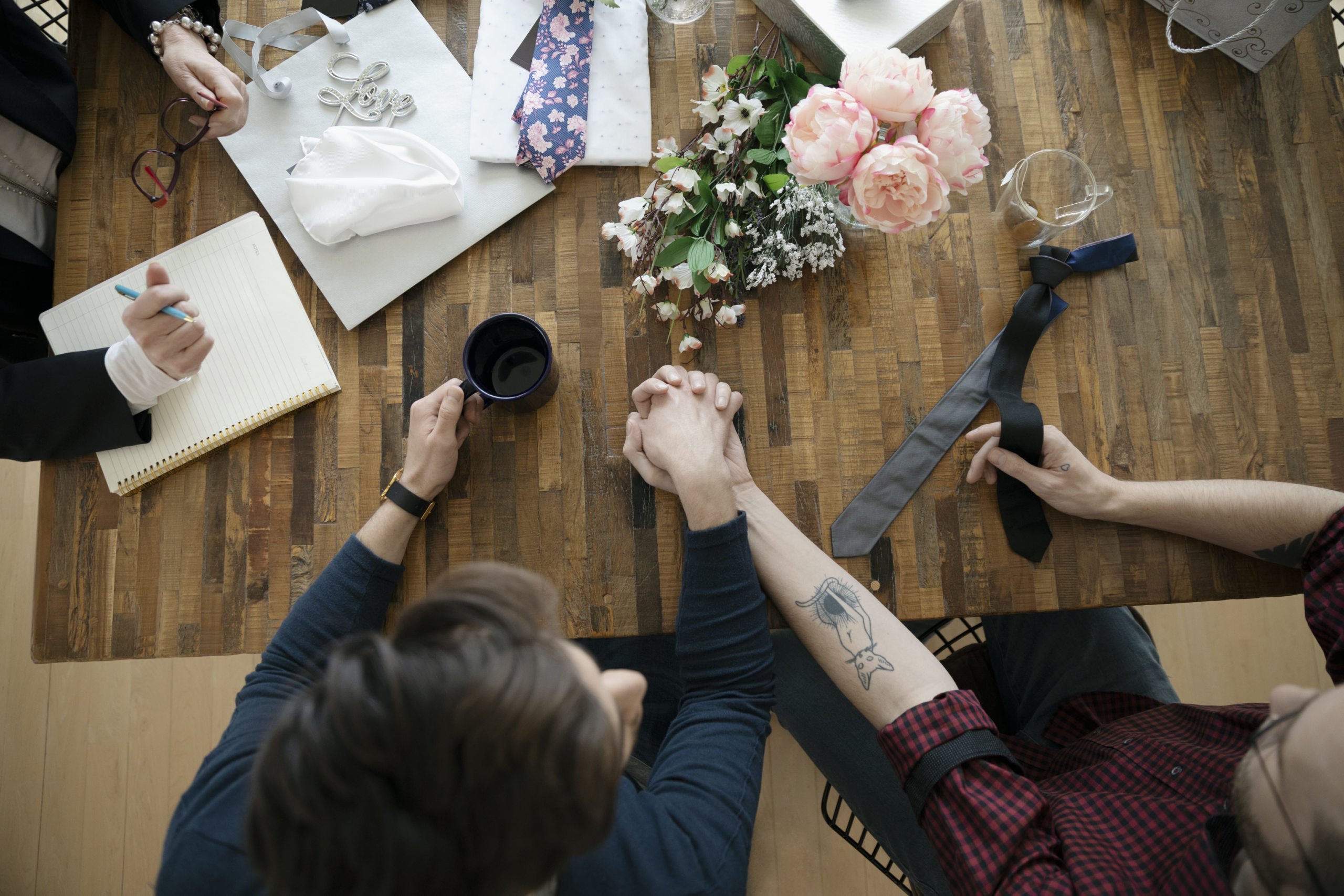Pop a bottle and pour the bubbly! Drinking is a natural fit for any celebration, and a wedding is no exception. In fact, alcohol is served at 92% of wedding celebrations, according to The Knot’s survey of weddings in 2018. The average cost of serving alcohol at a wedding was $2,564.
Whether you’re sticking to a simple champagne toast or springing for a full open bar, alcohol costs can quickly add up. Luckily, this is one wedding cost you have a lot of control and say over.
We talked to several wedding planners and real newlyweds to get their advice on how to keep alcohol costs within your wedding budget.
From figuring out how much alcohol to buy for a wedding to selecting an open bar wedding package, here’s what you should know.
Wedding Alcohol Costs and Options
What you’ll pay for drinks at your wedding, of course, will depend on the type of options you want to offer your guests. It can be helpful to first to understand what your options are so you can start weighing them.
Here are common bar packages and other alcohol options you might consider as you’re planning your wedding celebrations.
More expensive: Open bar wedding
With an open bar at your wedding, you’re typically charged a flat rate per person for each hour of bar service. This may be a more expensive option, but it has the benefit of a fixed cost.
The flat-rate pricing “may work to your benefit depending on how heavy of a drinking crowd you have,” says New York wedding planner Katharine Phillips of Katharine Phillips Event & Design.
How much is an open bar at a wedding? Your costs can vary quite a bit based on the venue and alcohol package you choose. For a full open bar with premium liquors, The Knot puts the average cost at $4,147, while an open bar limited to cheaper spirits averages $2,550. And while this is the costliest option for most couples, it’s also the most popular — 56% of couples opt for an open bar wedding.
More expensive: Open bar billed by consumption
Another option for an open bar is to pay by consumption. This option is “a bit similar to open bar in terms of service for your guests, but differs in that the bar or catering staff keeps track of each drink, and you get a bill based on the tab,” Phillips says.
This means you’re charged only for what guests drink, which could be cheaper. But it can also make this wedding cost unpredictable if guests go overboard.
More cost-effective: Cash bar wedding
A cash bar offers a full range of drinks — but guests pay for their drinks, instead of you. This means you can have alcohol at your wedding celebrations without having to cover the costs.
Generally, however, a cash bar wedding is traditionally considered a less hospitable and gracious option. It’s likely why it’s a less popular option, chosen for just 7% of weddings, according to The Knot.
Phillips encourages couples to pay for and offer some complimentary drinks, or at least two drink vouchers, to guests. “I think that would be a great compromise and way to save some money on the bar,” she adds.
More cost-effective: Bring your own booze
Another option to consider is buying and providing alcohol on your own, rather than paying a caterer or venue to do so. This gives you more control over what you’re serving — and what it’ll cost you.
“The more obvious and notable pro to this is that you’re buying the supplies at market rate and not being charged a premium, which would save you money,” says Phillips.
However, “the cons are that without the experience to anticipate bar needs, you could run out of supplies,” she adds. Or, you might unnecessarily over-buy and have leftovers.
So, make sure you accurately estimate how many drinks you’ll need. An event alcohol calculator can give you a good starting point, but you might also want to consult your wedding planner or caterer for an expert estimate.
No alcohol expenses: A dry house
Last, you can skip the alcohol altogether and have a dry wedding. This can make sense if you know that many of your guests are sober or don’t drink, or you’re just generally wary of serving alcohol. You might also choose a dry wedding if alcohol simply isn’t a wedding expense you care to prioritize.
There are always non-alcoholic beverages you can offer up instead, whether that be kombucha or a coffee bar for a morning celebration, says Lauren Grech, CEO & co-founder of LLG Events in New York, N.Y.
“But ultimately, you shouldn’t need any additional flair just because you’re opting out of alcohol for your wedding,” Grech says. “The guests who are attending should recognize that the point of the day is to celebrate you as a couple, the way you want to start your life together.”
Bar offerings options
On top of choosing between an open, cash, or DIY bar, you can also consider the kinds of alcohol you’d like to serve. Limiting the range of options for your guests can bring costs down quite a bit.
Here are some ranges of bar offerings, from what’s generally more expensive to least:
- Premium full bar with wine, beer, and a full range of top-shelf liquors and traditional cocktails
- Full bar, but with well liquors instead of premium spirits
- Soft bar with signature cocktails, which serves wine and beer along with one or two drink options
- Soft bar, which is limited to wine and beer only
- A single drink option, such as a champagne toast only, or selection of beers
Other Choices That Impact Wedding Alcohol Costs
Your options and costs for serving alcohol at your wedding, however, depend a lot on other choices you make for your wedding. It’s important to keep your plans for your wedding bar or alcohol in mind when making these key decisions.
The venue and caterer
Perhaps the biggest is your choice of venue or caterer. Many, but not all, wedding catering services and venues offer alcohol packages alongside other services. Other venues may not allow for any outside alcohol to be brought in, or for alcohol to be served at all. So along with talking about the dinner menu and seating, be sure to include alcohol in your discussions about services and costs.
Joslyn Beile, a nonprofit operations director, chose a private club just outside of Sacramento, California, as the venue for her 2015 wedding. The biggest selling point of this venue, Beile says, was its flexible alcohol policies. She was able to hand-select three beers and two wines to serve, and even brought in a keg from her favorite brewery.
“The club also didn’t charge us for unopened or partially-consumed bottles,” she adds. “Guests were still able to freely imbibe, but the costs were significantly lower than a full bar option.”
Her total costs for unlimited beer and wine for 150 people over 5.5 hours came to just $1,086.
The guest list
More guests will mean paying for more drinks, so it’s important to know how many people will attend your wedding reception.
But beyond setting your guest count, “you should estimate what percentage of your guests would be drinking at your wedding reception,” says Kristina Savina, who works for wedding planning site Wedding Forward. If you know your guest list is full of heavy drinkers, that can help you decide on the best alcohol option or package.
This was part of the strategy for Bethany McCamish, a designer and founder of personal finance blog His and Her FI, in planning her wedding set for June 2020. She’s keeping the guest list small for her destination wedding in Hawaii, at just 25-30 guests.
McCamish is also opting for a cash bar, along with complimentary rum Mai Tai punch provided by the catering service.
“We want to provide a few ‘free’ drinks at the wedding for guests and then have the cash bar for those who want to drink heavily,” she says. McCamish puts her total wedding alcohol costs at $1,100.
The wedding reception timing
Take the timing of your wedding celebrations into account when settling on alcohol options, too. The hour of the day can determine how ready your guests are to party.
“If it’s in a brunch reception after a sunrise ceremony, many will likely be asking for a coffee bar,” Grech says. Even if you opt to serve alcohol, guests may still drink less at a luncheon that they would at an evening reception.
The day of the week can have a similar impact on how ready guests are to party.
“If the wedding is on a Sunday or weekday when most people have to work the following day, they’ll be less likely to complain,” if you choose a dry event, cash bar, or otherwise limit drink options, Grech says.
Reception duration
Many alcohol packages charge by the hour for bar services, and guests tend to drink more the longer a party is. So, planning out how long you expect your wedding reception to last can help keep your wedding alcohol costs predictable.
“On average, a wedding reception lasts about five hours,” says Savina. “Usually, wedding planners assume that guests will have two drinks in the first hour of the open bar, and one additional drink each following hour.”
If you choose to keep your reception shorter or stick to a strict closing time on the open bar, this can keep alcohol costs under control.
Elizabeth Rivers, founder of travel blog Anchored Adventure, used this strategy to keep a cap on open bar costs for her May 2018 wedding in Louisville, Kentucky. The wedding invite left an open arrival time of 6:30 to 7:30 pm.
“Since everyone arrived at various times, not nearly as many drinks were consumed as a typical cocktail hour,” Rivers says. The open bar also closed during dinner, offering wine served at the table instead.
Liability and liquor laws
Going the DIY route and providing your own alcoholic beverages can be another way to save. Stephanie Kibler, founder of personal finance blog Poorer Than You, took this route when planning her 2014 wedding.
“We bought all the alcohol ourselves and looked for deals wherever we could,” she says. In all, she spent just $600 on bottled drinks like wine, beer, and cider, along with cups, ice, and other extras for serving the drinks.
If you choose a BYOB wedding, however, you’ll need to make sure it’s all above-board and plan for extra costs. Make sure the venue allows outside alcohol to be brought in. You should also look into your state’s liquor laws, Phillips advises, as some states only allow alcohol to be served by a provider with a liquor license.
Even if a liquor license is required, you might actually be able to get one yourself. Kibler did exactly that, paying a $55 fee to get a liquor license that covered her reception.
Liability can also be a consideration when drinking is involved, so it’s wise to purchase alcohol insurance for a wedding if you’re providing the drinks. Kibler dropped $300 on alcohol insurance for the wedding and $150 for a venue alcohol fee. Her total wedding alcohol costs came in at $1,105.
The Bottom Line: Choose Wisely To Keep Wedding Alcohol Costs Under Control
As an engaged couple, you’re probably drunk on love and excitement for your wedding. But don’t let that cloud your judgment.
While the average cost of alcohol at a wedding is around $2,500, having drinks at your reception can cost a lot less. The women we spoke to spent half that or less, while still serving up beverages that aligned with their visions for their big days.
But keeping wedding alcohol costs low will require clear-headed decision making. Make sure you’re keeping alcohol options and costs top-of-mind as you plan your wedding.



